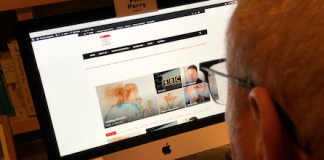- X marks the spot again - 17th February 2026
- Wordy again part three - 16th February 2026
- ‘Lies, damned lies etc…’ - 13th February 2026

The Labour leader has been drawn into a growing controversy about the safety of a conviction after one of the worst murders in legal history as it emerged he was a leading lawyer for a man who successfully sued the police following a high-profile miscarriage of justice case in South Wales, The Eye can exclusively disclose.
Sir Keir Starmer has been sent a dossier of recent cases in Wales after representing Michael O’Brien who was wrongly convicted of murdering the Cardiff newsagent Phillip Saunders, and he tells him that lessons have still not been learnt.
Sir Keir is asked to pay close attention to the case of David (Dai) Morris who was jailed in 2002 for the murders of four people in Clydach, and Mr O’Brien informs him he believes that this is another wrongful conviction.
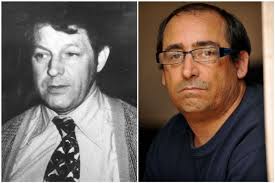
Mr O’Brien thinks Sir Keir may take up the case as he was victorious in suing South Wales Police for “Malicious prosecution in 2008”, after his own 11 year spell in prison.
He writes to him: “Attached is a dossier of Miscarriages of Justice which has occurred in Wales Since 1982- 2016. Since you won my case against the police for Malicious prosecution in 2008 O’Brien v South Wales Police lessons have not been learnt and draw your attention to my dossier and in particular the case of David Morris who was wrongly convicted of the Clydach murders in 2002 and Joe Fettah in 2016”.
A further letter to Sir Keir was written by Morris himself, although he has been prevented from sending it.

Sir Keir is a former Director of Public Prosecutions (DPP) and head of the Crown Prosecution Service (CPS), and is viewed as a hugely important figure by campaigners such as Mr O’Brien.
He has transformed Labour’s political fortunes in the three months since he took over as leader, and is now level in polls with Boris Johnson on the question of who would make the best Prime Minister.
Morris was given four life sentences in 2002, following the brutal murders of an elderly disabled woman, her daughter and two young grandchildren in the village of Clydach near Swansea.

After a jury found him guilty of using a heavy pole to beat the family to death, a judge said that Morris, who was aged 52 at the time, of Craigcefnparc, should never be released.
He was labelled “probably one of the most dangerous people in the United Kingdom” by the prosecution in one of the two cases in which he was found guilty.
But there is mounting pressure from a campaigning organisation saying that the man put behind bars is innocent.
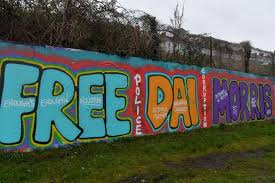
A support group on Facebook (FB) now has more than 20,000 members, a network BBC TV Panorama Current Affairs programme presented by our Editor Phil Parry which cast fresh doubt on the appalling case is now on YouTube, a protest rally has been held, and graffiti in support of Morris has appeared on buildings in Swansea.
Over two years ago, the Criminal Cases Review Commission (CCRC) told Morris his case wasn’t currently considered appropriate for appeal, despite years of lobbying by his family

The same year, retired Swansea solicitor, John Morris (no relation), published a book about the case – The Clydach Murders – which claimed that Morris was not the murderer and could not have killed the four, because of a lack of evidence linking him to the scene.
In December, campaigners rallied in Swansea calling for his release.

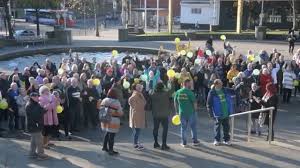
Scores of protesters gathered at Castle Square in the city centre carrying green and yellow balloons and ribbons.
The month before, the campaign had been launched to demand Morris’ freedom, with ribbons of the same colour on cars in the city.
The protest group at the rally handed out leaflets and chanted “Free Dai Morris”.
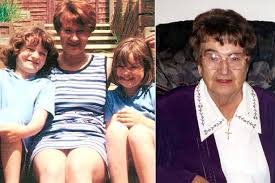
Their ultimate aim was to raise political awareness (and may now have succeeded) in the hope of forcing the case back open.
Geraint Evans, who helped to run the group, said at the rally: “There’s massive support for him (Morris), not only in Swansea but across the UK.
“We are here to raise awareness in Swansea for the people who are not on social media.
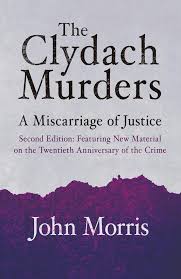
“The members just keep growing and at the moment we are getting between 200 and 300 a day.”
Donna Hayes, from Penlan, said she was at the rally to “raise awareness” of the campaign.
“I believe that Dai is innocent”, she told reporters. “I don’t know the family but I feel strongly that he should not be where he is”.
Also at the event was Mr O’Brien himself, who was slated, too, as one of the speakers at a meeting in support of Morris which was planned for March but had to be postponed because of the crisis over coronavirus (Covid-19).
Mr O’Brien was one of the so-called Cardiff Newsagent Three who was released following another TV programme presented by Mr Parry called ‘A Night to Remember’, this time in the BBC Cymru Wales TV Current Affairs strand ‘Week in, Week Out’ (WIWO), which has now been scrapped in favour of BBC Wales Investigates.
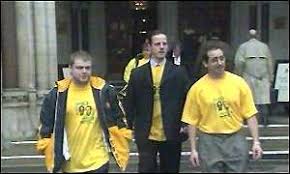
Mr O’Brien was handed a life jail sentence for a murder he did not commit after being found guilty in 1988 of killing Cardiff newsagent Phillip Saunders.
Following the WIWO, his conviction was quashed in December, 1999.
Over a few short weeks the social media group calling for the release of the man he is now campaigning to be freed, Morris, went from hundreds of members to several thousand.
 The Labour leader is unlikely to join the group, but at least Mr O’Brien knows he has now been told about Morris and the Clydach murders case…
The Labour leader is unlikely to join the group, but at least Mr O’Brien knows he has now been told about Morris and the Clydach murders case…
Tomorrow – Mr Parry shows why neutrality and objectivity in journalism are under threat as never before.
The memories of his extraordinary 36-year award-winning career in journalism (including the Clydach murder case) as he was gripped by the rare crippling neurological condition Hereditary Spastic Paraplegia (HSP), have been released in a major book ‘A GOOD STORY’. Order the book now!









